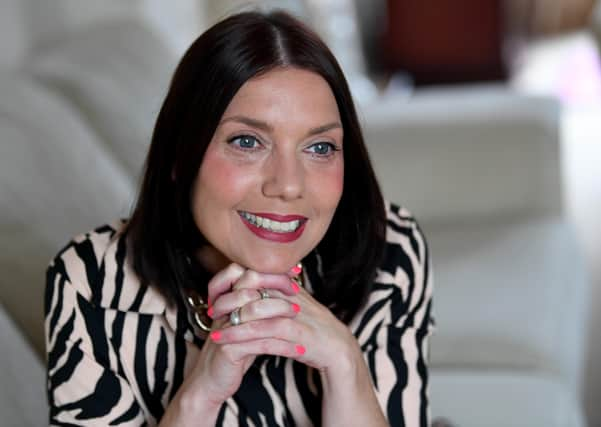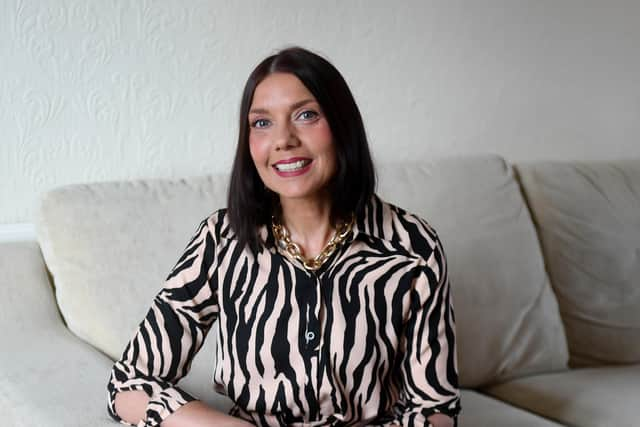Selma Blair’s journey with MS inspired me, says Yorkshire mum who went to Mexico for treatment


The moving film, by the star of Cruel Intentions and Legally Blonde, shows Blair undergoing chemotherapy and in isolation in a hospital as she undergoes an intensive form of treatment for her MS known as HSCT (haematopoietic stem cell transplantation).
Introducing, Selma Blair is an honest account of her life with MS and the treatment that didn’t give her quite the cure she had hoped for.
It is a familiar story for Kate Dawson, from Pontefract.


Advertisement
Hide AdAdvertisement
Hide AdKate, 46, was diagnosed with MS in 2010 and travelled to Mexico for HSCT in 2016.
HSCT is an intensive chemotherapy treatment that aims to stop MS damage by removing harmful immune cells from the body.
The person’s own stem cells are then used to regrow and ‘reboot’ the immune system. The MS Society wants the treatment to be made available in the NHS.
Kate was 35 when she was diagnosed. Super fit and sporty, she first noticed a problem when she was out running and her foot was dragging.


Advertisement
Hide AdAdvertisement
Hide AdShe initially went to see a chiropractor who referred her to a neurologist who diagnosed MS.
A few years after diagnosis Kate’s legs started to feel heavy and she couldn’t run anymore. She had brain fog and had to go part-time at work (she was a teacher).
Eventually she had to resign when she was 40 as she couldn’t even stand up in the classroom.
The mother-of-two said: “My back was so bad that I couldn’t even stand up straight to cook the boys’ tea.”
Advertisement
Hide AdAdvertisement
Hide AdShe tried everything for her MS and then heard about HSCT in 2016 in a Panorama documentary.
She was turned down for the treatment on the NHS as she didn’t meet the narrow criteria due to the type of MS she has.
She started fundraising to travel to Mexico to get the treatment – she needed to raise £45,000 – and money came in from family and friends. After her story appeared in The Yorkshire Post she received £32,000 from an anonymous donor.
“I still have no idea who the donation came from but I will be forever grateful to them and all the other people, like 86-year-old Brenda Cuttle who donated £5,000 even though she had never met me.”
Advertisement
Hide AdAdvertisement
Hide AdThe treatment was really intense – her father travelled with her and her husband and mother stayed home to look after her two boys. “The hardest part was leaving the boys – they were 16 and 14 at the time and I had never left them for any long period before. I did ring them every day and that kept me going when things got really tough.”
The treatment lasted for four weeks. In between two lots of chemotherapy, there were infusions to boost the stem cells her system was producing which are then harvested before being returned after chemotherapy.
“I was quite ill with the second lot of chemo and lost about a stone,” recalls Kate.
Five years on, Kate says although it’s not the cure she hoped for, it has slowed her MS progression. Almost instantly her foot drop disappeared and she has also lost the pain in her lower back. For a year after HSCT her walking improved although it’s now worsening again.
Advertisement
Hide AdAdvertisement
Hide Ad“I think I went in with my eyes open but you always have to have hope and be positive. I would definitely have the treatment again if I could.”
The other area she was hoping would improve was her irritable bowel syndrome and bladder problems, but that hasn’t seen much change. The treatment has also led to the onset of early menopause. She now uses yoga, breathwork and diet to help her manage her MS.
“I am looking at other areas like changing my lifestyle and my diet and I have had my DNA checked,” says Kate, who wants to help other people deal with an MS diagnosis.
She says Selma Blair has helped her in terms of more understanding of MS from others – as well as giving her more confidence to go out and not shy away from certain events.
Advertisement
Hide AdAdvertisement
Hide Ad“I don’t like going into restaurants because of the way I walk, but seeing Selma out there raising awareness I do think ‘if Selma can go on a red carpet, then I can go out to the local cafes’. She has really helped me and I would like to help other people.”
While she doesn’t shout about her MS, she’s happy to talk about it anyone now – and it’s taken her a long time to do that.
Despite having to stop teaching Kate has not given up working. She has set up a property company with holiday lets in Whitby and also renovated a local property with her son during lockdown.
Sarah Rawlings, executive director of research and external affairs at the MS Society, says: “Selma Blair’s documentary is incredibly raw and powerful and will do a great deal to raise awareness of the impact multiple sclerosis can have. MS is relentless, painful and disabling and throughout the film we see Selma struggling with her walking and speech.
Advertisement
Hide AdAdvertisement
Hide Ad“The documentary follows her as she decides to have stem cell treatment, or HSCT, for her MS. We know this intensive treatment is likely to be most effective when people with MS, like Selma, are having lots MS attacks or there’s evidence of inflammation on an MRI scan. In the UK, HSCT is available on the NHS but eligibility criteria are strict and it can be difficult to access. We’re calling for everyone who is eligible to be able to get the treatment on the NHS, if they want it.”
In the brutally honest documentary, the actress talks about how she felt about the MS diagnosis.
“The truth is, the diagnosis gave some relief because then I could take steps. But then as I started taking steps and things were going backwards I felt frustrated because I knew the meds were just making me feel worse. So, the options ran out. A stem cell transplant is the thing that’s going to help me, if anything will,” she says.
She also explains after the treatment and her disappointment that it wasn’t the magic cure she had hoped for.
Advertisement
Hide AdAdvertisement
Hide Ad“I’m a really confused that I just didn’t make this miraculous recovery. But I did truly believe I would wake up one day, three months from stem cell and go ‘Oh my God, this is what everyone else feels.’ And it didn’t happen in the way I thought it would because my physical health is still very challenging.”
But Kate believes just making the documentary about the actress’ journey with MS is really helpful to other people with the debilitating condition.
“Not only does Selma help people like me feel not so alone and others understand MS, but I hope by raising awareness we will help raise more fund for a cure,” she says.
Introducing, Selma Blair is available to stream on Discovery+
Comment Guidelines
National World encourages reader discussion on our stories. User feedback, insights and back-and-forth exchanges add a rich layer of context to reporting. Please review our Community Guidelines before commenting.